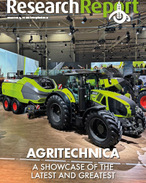Kondinin Group engineer Ben White recently inspected an XAG P30 unmanned aerial vehicle (UAV) in a demonstration spraying operation at a recreation field in Mundaring, Western Australia.
The drone has a maximum take-off weight of 38.5kg and carries 12L of chemical in an interchangeable container.
For precise positioning, the P30 uses an on-location RTK base station, but can use other differential GPS correction methods including CORS if needed.
Chemical containers are filled using a dedicated metered fill station. When attached to the drone, a peristaltic pump delivers chemical to rotary atomisation discs which spin at variable rates to alter droplet size. Droplet size is adjustable from 85μm to 550μm.
Once the containers are loaded onto the drone, chemical density, temperature and volume are analysed and flight routines are adjusted accordingly.
While the drone has a nominal 20 minute battery life, Andrew Dedman, co-founder of Stratus Imaging and the drone pilot on the day, said that in most spraying scenarios, the operator was more likely to run out of chemical before running out of battery
Operating speed for the demonstration was 2m/s (7.2km/h) but the P30 is capable of spraying at up to 6m/s (21.6km/h) with a swath width of 3m according to Dedman. The higer speed equates to a coverage rate of 6.5ha/h per drone, less downtime for manually swapping over of the chemical containers and batteries.
Up to five P30s can be flown concurrently. In a swarm configuration, the UAV's work together to spray the defined area in an efficient way to minimise both downtime and transit time.
The four rotary atomisers dispense up to 2.7L/minute each and application rate depends on ground speed. For example, at the demonstrated 2m/s, this equates to 300l/ha but at the maximum spraying speed of 6m/s, the application rate would be 100L/ha.
Dedman said the P30 was IP65 rated, so at the end of a spraying job it can be rinsed down after operation.
Dedman said that he has flown up to four P30 units concurrently in a swarm for CASA certification.
Spray zones are defined using an RTK survey rover or by map selections to determine zone boundaries.
The requirement for manually loading chemical and maintained visual line-of-sight during operation means we are unlikely to see drones taking over the role of traditional boomsprays any time soon.
But the P30 did demonstrate it could definitely be applied for specific roles. These include spraying small areas inaccessible by helicopter or traditional spraying units. The P30 is also capable of applying chemical precisely and over ground that is non-trafficable.
For now, spraying recreation fields, forestry and tricky or non-trafficable terrain are the ideal applications for drone spraying. Kondinin Group will continue to observe as the technology evolves.
In the meantime, the Stratus Imaging team is providing contract drone spraying services including swarm drone applications. They are the first in Western Australia to do so.
More information: www.stratusimaging.com.au























